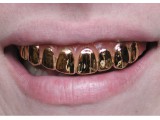;)
Interest rates depend on what currency your account is in.
Swiss francs accounts pay an interest rate that is usually quite low and there is a witholding tax to boot. This is not very attractive and most people (apart from the Swiss) have their Swiss bank account in some other currency such as US Dollar, British Pound or Euro.
Non Swiss franc accounts pay interest in a slightly different way. Your banker puts the money in a special type of fund called money market fund to get you the interest. There is a small cost (usually below 1%) to move the money into the fund, but there are absolutely no penalties and no notice period when you withdraw money. The minimum needed to enter most of these money market funds is only about $200. In Switzerland, this is the standard way of getting interest on non Swiss currencies.
1. Swiss withholding tax
Dividends and interest paid by Swiss companies are subject to a 35% withholding tax. The bank will keep 35% of the interest or dividend and send it to the Swiss tax authorities on a no-name basis. This tax concerns mainly Swiss clients. Non-resident very rarely pay this tax since they usually do not invest in Swiss companies. Even if you want to earn interest in Swiss francs, you just need to invest the funds in a money market fund to be exempt from this whitholding tax.
2. US persons
US persons (i.e. US citizens, green card holder and US taxpayers) need to report their Swiss account to the IRS.
Read more ...
3. EU residents
In July 2005 Swiss banks introduced a withholding tax on the interest of some investments owned by clients who live in the European Union. There are no changes to Swiss bank secrecy and clients who live outside of the EU are not concerned by this new tax (known as ESD or ‘EU savings directive’).
Interest-bearing investments owned by residents of the European Union will be taxed at 15% at the source. This tax will increase gradually to reach 35% in 2011. Nobody else is concerned by this tax. European citizens living abroad are not liable either. This is the only change. The tax is paid by the bank to the Swiss government on a no-name basis. Those who wish so can get the tax back if they report their Swiss bank accounts on their tax returns.
This new tax is the fruit of hard bargaining between the EU and Switzerland (not member of the EU). In essence the EU wanted that we would give up Swiss bank secrecy and Switzerland refused and only agreed to a gradual withholding tax to be collected by Switzerland and shared with the EU.
Although we are never happy to see a new tax, the Swiss banking industry see this agreement as the guarantee that Swiss banking secrecy will continue to exist as today.
This of course doesn't mean that you are not legally required to report the income in your country of residence - ask a local tax accountant if in doubt
διότι η φορολόγηση των καταθέσεών σου στην Ελβετία είναι της τάξεως του 5 η 10 % επί της αποδόσης/








